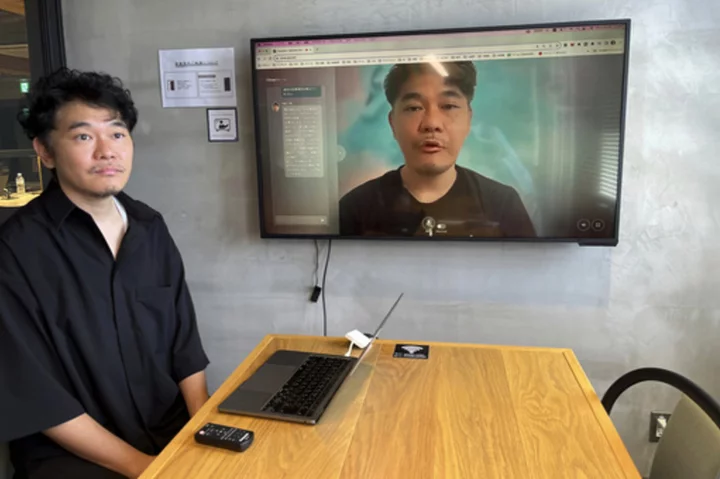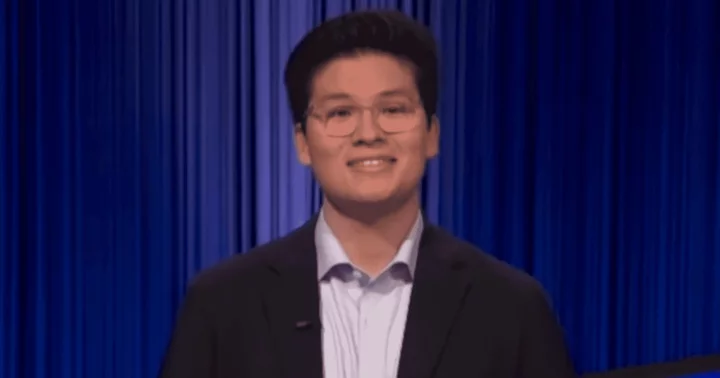TOKYO (AP) — Kazutaka Yonekura dreams of a world where everyone will have their very own digital “clone” — an online avatar that could take on some of our work and daily tasks, such as appearing in Zoom meetings in our place.
Yonekura, chief executive of Tokyo startup Alt Inc., believes it could make our lives easier and more efficient.
His company is developing a digital double, an animated image that looks and talks just like its owner. The digital clone can be used, for example, by a recruiter to carry out preliminary job interviews, or by a physician to screen patients ahead of checkups.
“This liberates you from all the routine (tasks) that you must do tomorrow, the day after tomorrow and the day after that,” he told The Associated Press as he showed off his double — a thumbnail video image of Yonekura on the computer screen, with a synthesized version of his voice.
When his digital clone is asked “What kind of music do you like,” it pauses for several seconds, then goes into a long-winded explanation about Yonekura's fondness for energetic rhythmical music such as hip-hop or rock 'n' roll.
A bit mechanical perhaps — but any social gaffes have been programmed out.
Yonekura, 46, argues that the technology is more personal than Siri, ChatGPT or Google AI. Most importantly, it belongs to you and not the technology company that created it, he said.
For now, having a digital double is expensive. Each Alt clone costs about 20 million yen ($140,000), so it will likely take some time before there's a clone for everyone.
In creating a digital double, information about a person is skimmed off social media sites and publicly available records in a massive data collection effort, and stored in the software. The data is constantly updated, keeping in synch with the owner's changing habits and tastes.
Yonekura believes a digital clone could pave the way for a society where people can focus on being creative and waste less time on tedious interactions.
For many Japanese — the nation that gave the world Pokemon, karaoke, Hello Kitty and emojis — the digital clone is as friendly as an animation character.
But Yonekura acknowledges cultures are different and that Westerners may not like the idea of a digital clone as much.
“I can’t tell you how many times I’ve been asked: Why does it have to be a personal clone, and not just a digital agent?” he said, a hint of exasperation in his voice.
Yonekura’s company has drawn mostly domestic investments of more than 6 billion yen ($40 million), including venture capital funds run by major Japanese banks, while also building collaborative relationships with academia, including the University of Southern California and the University of Tokyo.
But large-scale production of digital doubles is a long way off — for now, the company offers more affordable voice recognition software and virtual assistant technology.
Matt Alt, who co-founded AltJapan Co., a company that produces English-language versions of popular Japanese video games and who has written books about Japan, including “Pure Invention: How Japan Made the Modern World,” says the digital clone idea makes more sense culturally in Japan.
Ninjas, the famous feudal Japanese undercover warriors, were known for “bunshin-jutsu” techniques of creating the illusion of a double or a helper in battle to confuse the opponent. The bunshin-jutsu idea has been adopted and is common in modern-day Japanese video games and manga comic books and graphic novels.
“Who wouldn’t want a helping hand from someone who understood them intimately?” Alt said but added that in the West, the idea of an existing double is “more frightening.”
"There is the ‘Invasion of the Body Snatchers,’ for instance, or even the brooms that multiply like a virus in Disney’s ‘Fantasia’,” he said.
INCS toenter Co., another Tokyo-based startup, has been successful as a production company of computerized music for animation, manga, films, virtual realities and games that uses so-called Vocaloid artists. The synthesized singers or musical acts known as Vocaloid are often paired up with anime- or manga- style characters.
Like Yonekura’s digital clone, Vocaloids are an example of Japanese technology that uses computer software to duplicate human traits or likeness.
Among INCS toenter's hits is “Melt,” created on a single desktop in 2007 and performed by a group called Supercell, which has been played 23 million times on YouTube.
A more recent hit is “Kawaikute gomen,” which means “Sorry for being so cute,” by HoneyWorks, a vocaloid unit. Another is Eve, who performs the theme song of megahit animation series “Jujutsu Kaisen,” and has 4.6 million subscribers on his YouTube channel.
Some wonder whether digital clones or Vocaloids could become popular outside Japan. Digital assistant and voice software, as well as computerized music exist in the West, but they are not clones or Vocaloids.
Yu Tamura, chief executive and founder of INCS toenter, says he is encouraged by the increasing global popularity of Japanese animation and manga but that one thing to watch out for is the "Galapagos syndrome.”
The term, referring to the isolated Pacific islands where animals evolved in unique ways, is widely used in Japan to describe how some Japanese products, while successful at home, fail to translate abroad.
Overseas consumers could see it as quirky or too cutesy, except for Japanophiles, Tamura said.
“They simply won't get it," he said.
___
Yuri Kageyama is on Twitter https://twitter.com/yurikageyama









